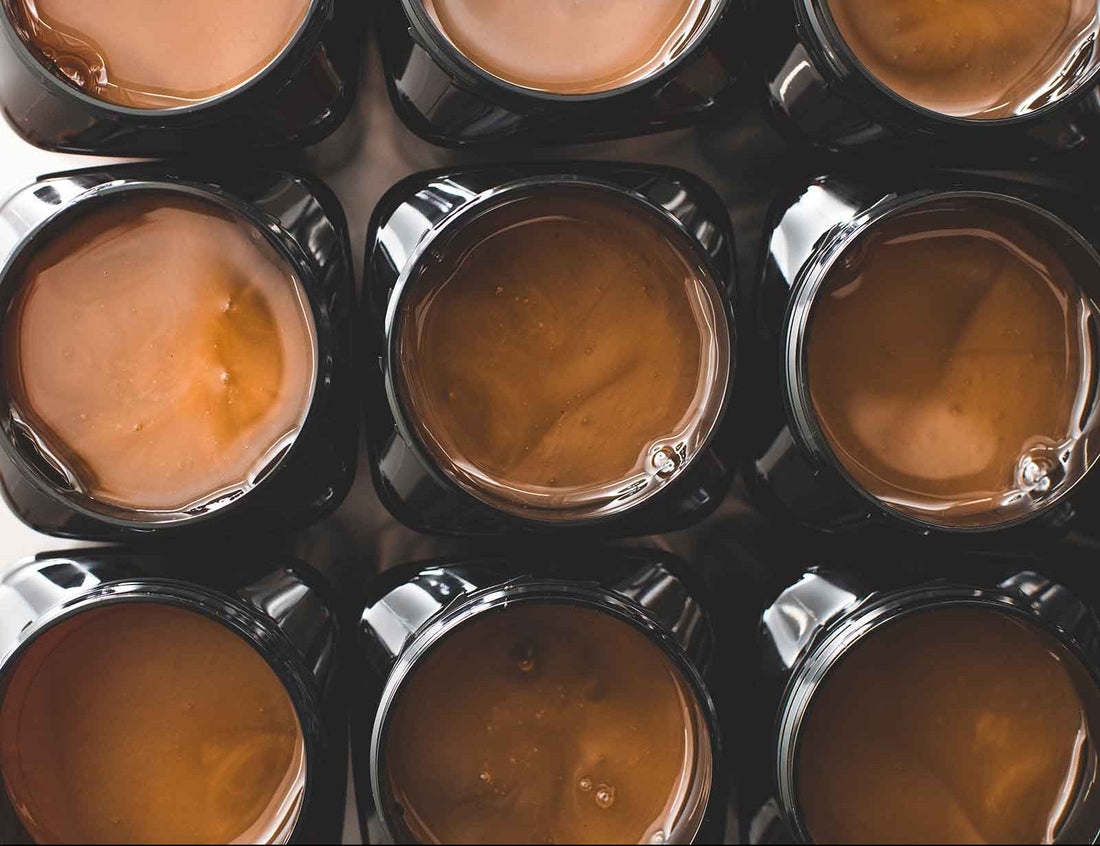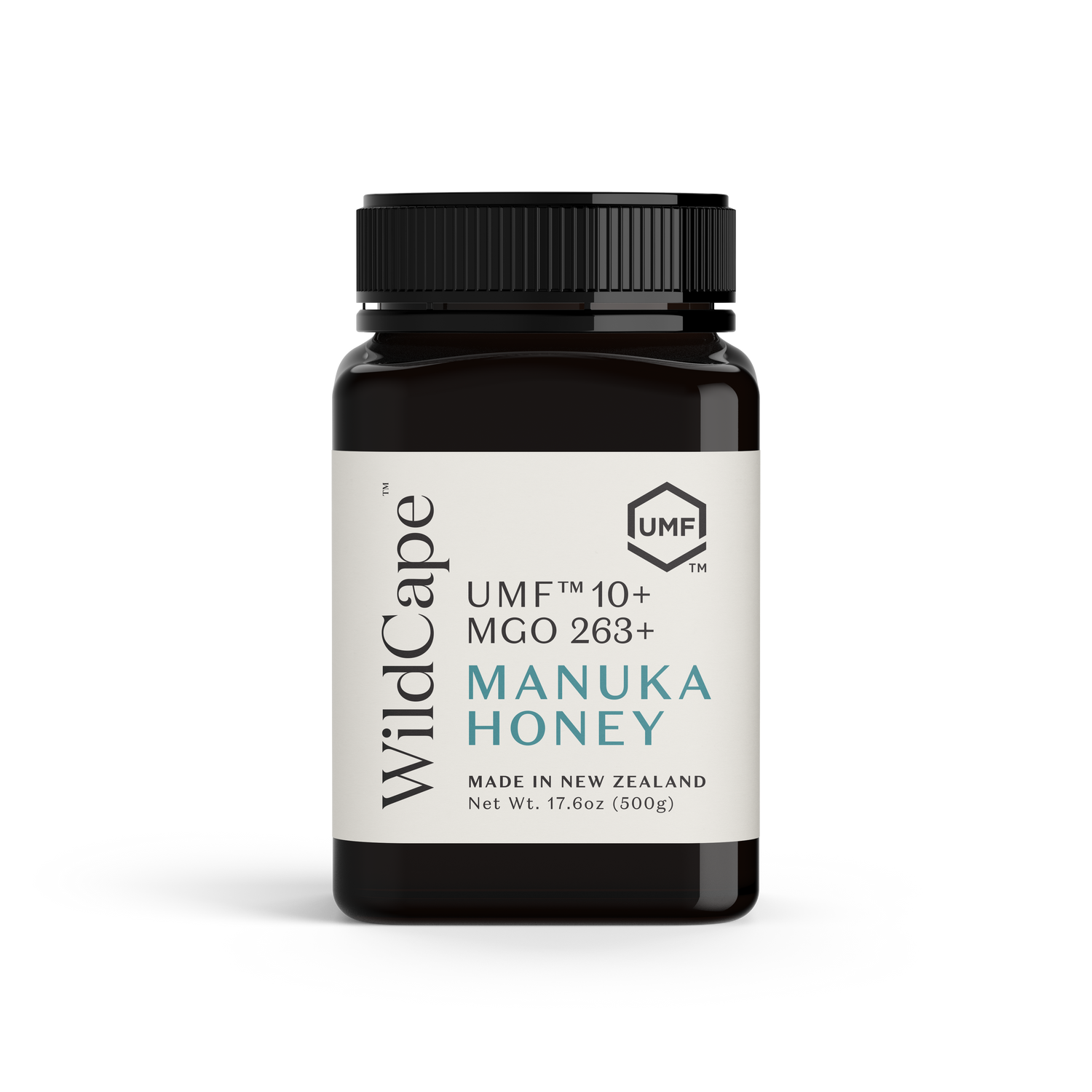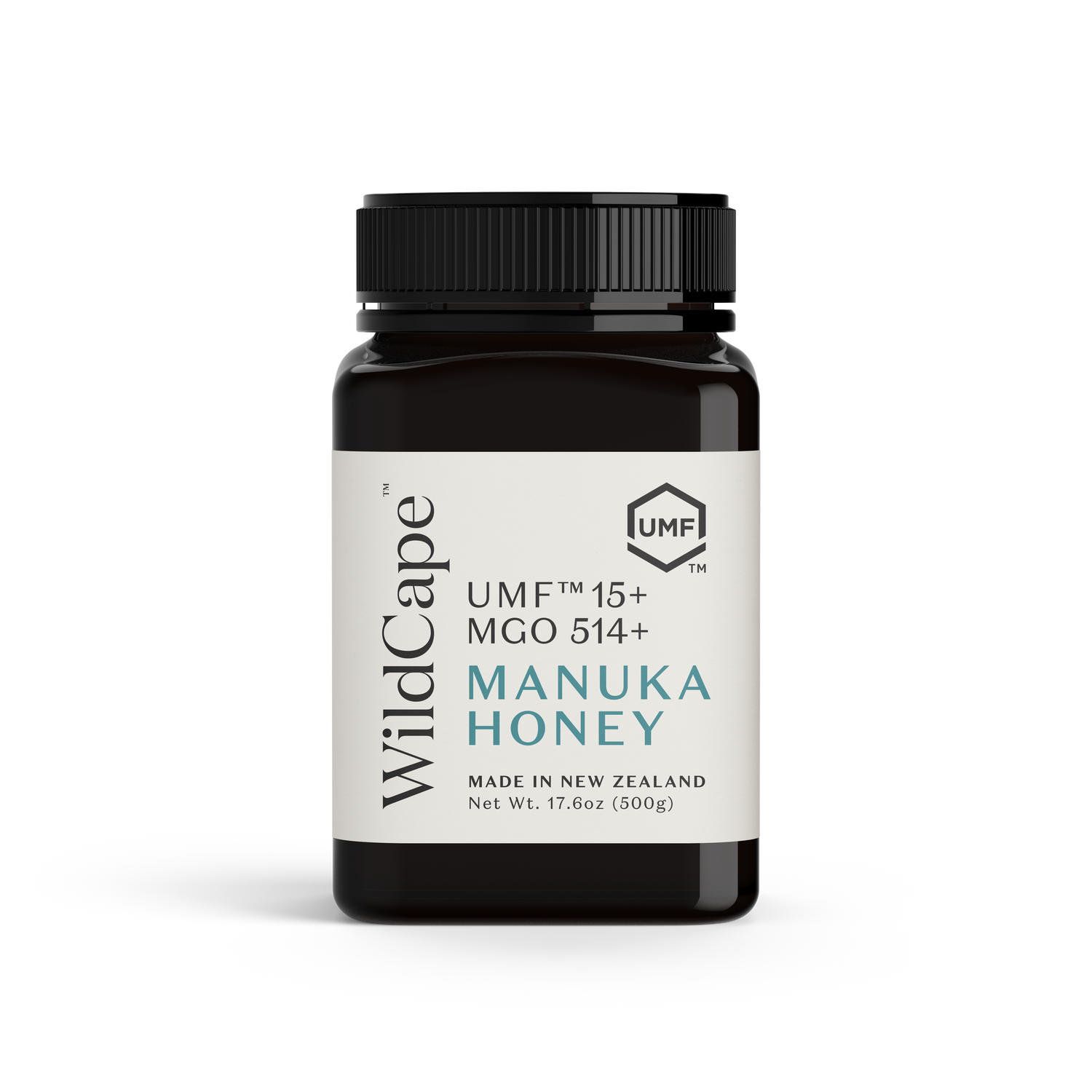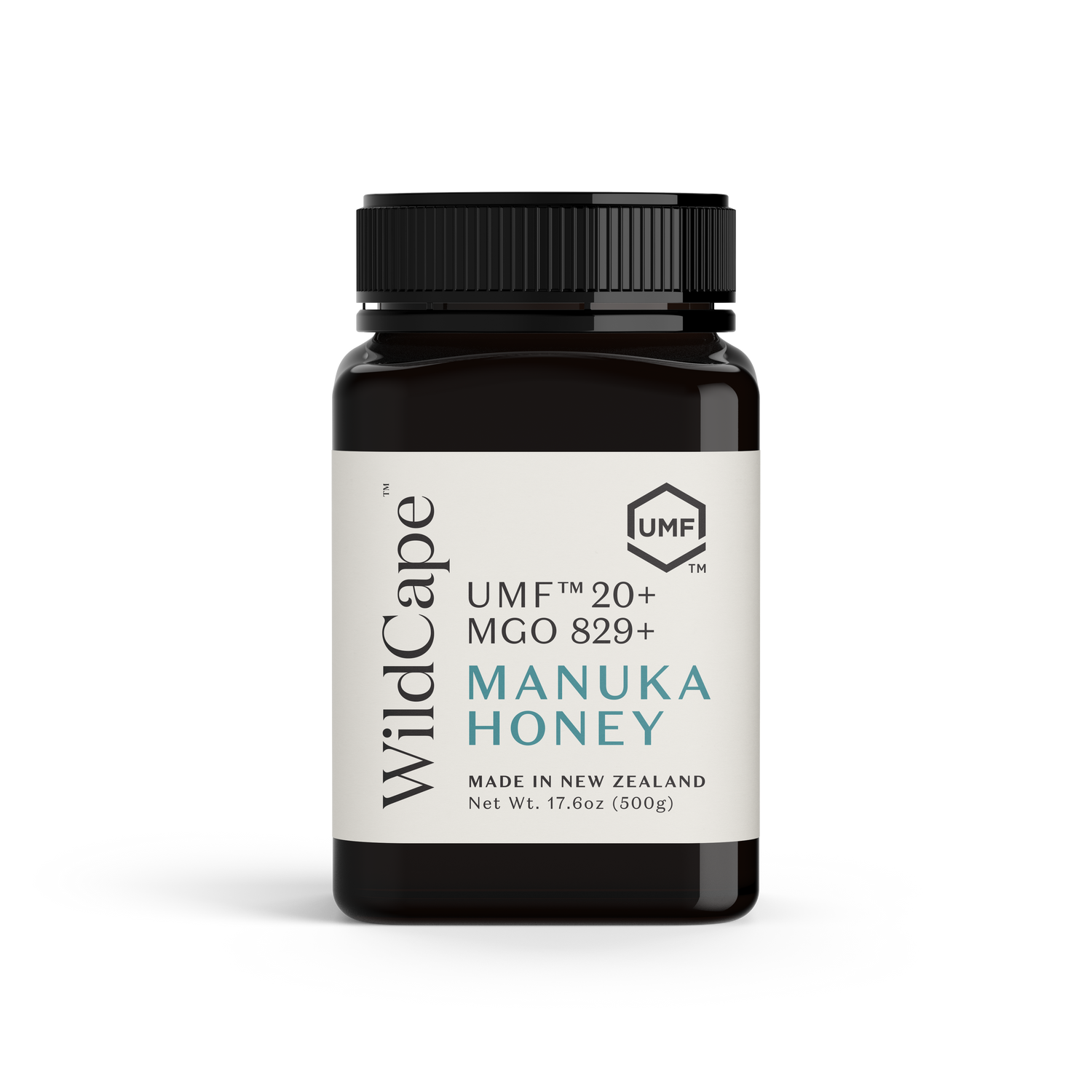Manuka honey has gained popularity for its numerous benefits for the skin. While it is best known for its antibacterial, antioxidant, and antimicrobial properties, Manuka honey can also moisturize and soothe dry skin. This makes it suitable for a variety of skin types. Some people have turned to Manuka honey for skin conditions such as acne and eczema, due to its antimicrobial properties.
While Manuka honey is not a substitute for medical treatment, incorporating it into your skincare routine may benefit your skin. You can use Manuka honey as a face mask, face wash, or natural moisturizer.
Remember not all Manuka honey is created equal. Manuka honey comes in various potency levels. Look for Manuka honey with at least a 10+ Unique Manuka Factor (UMF), to ensure you are getting the best product. If you’re considering using Manuka honey for acne, eczema, or other skin issues, it’s important to talk to a dermatologist or healthcare professional first to determine if it’s right for you.
Disclaimer: While we cannot advise on the topical use of WildCape Manuka honey, many people have reported using it as a facial mask or spot treatment for acne and other skin conditions. It’s important to note that everyone’s skin is different and it may not be suitable for all skin types. It’s important to use caution when applying any product to your skin and to perform a patch test before using it on a larger area. If you’re interested in incorporating WildCape Manuka honey into your skincare routine, it’s recommended to do further research and consult with a dermatologist or healthcare professional to determine if it’s right for you.
Benefits of Manuka Honey for Acne
Acne is a common skin condition that affects many people, and finding an effective treatment can be difficult. Manuka honey is a natural remedy that has gained popularity in recent years for its special properties. Applying Manuka honey directly to the affected area may be beneficial and help relieve irritated skin. In this medically reviewed article, Healthline had the following to say about Manuka honey: “Its anti-inflammatory effect can decrease local inflammation caused by acne. As an antibacterial, Manuka honey leaves fewer bacteria to infect pores and cause acne. This honey can heal existing pimples, as well.”
Although more research is needed to fully understand the benefits of Manuka honey for acne, many people have reported positive results after incorporating it into their skincare routine. It’s essential to note that everyone’s skin is different, and what works for one person may not work for another. It’s also recommended to find the best Manuka honey products with a UMF rating of 10+ or above. If you’re interested in trying Manuka honey for acne or other skin conditions, it’s important to talk to a dermatologist or healthcare professional first to determine if it’s right for you.
Benefits of Manuka Honey for Skin
Manuka honey has gained popularity as a natural ingredient in skincare due to its many benefits. Its special properties, indicated in strength by the Unique Manuka Factor, may potentially help to soothe, repair and protect the skin from damage. Manuka honey is believed to reduce inflammation, redness, and irritation, making it a potentially effective remedy for sensitive skin, eczema, and psoriasis. Additionally, its natural humectant properties may help to lock in moisture and prevent dryness, making it a popular ingredient in moisturizers, masks, and other skincare products.
While more research is needed to fully understand the benefits of Manuka honey, incorporating it into your skincare routine may be beneficial for your skin. Again, it’s important to note that everyone’s skin is different, and what works for one person may not work for another. It’s recommended to do further research and consult with a dermatologist or healthcare professional to determine if Manuka honey is suitable for your skin needs and type.
Should You Use Manuka Honey in Your Skincare Routine?
Ultimately we cannot give medical advice, and the decision whether or not to use Manuka honey in your skincare routine is entirely up to you. WildCape Manuka Honey is a popular Manuka honey for many applications, including its use as a skincare product.
Check out what these happy WildCape customers had to say about our UMF15+ Manuka honey:
Debi, USA says: “One of best Manuka honey brands. It helps my sinus infection. One tsp every night right before bed religiously. I finally didn’t have sinus infection in the winter. I always had sinus infection every winter. I haven’t had sinus infection for the past two winters. I also use it on my skin. It does help my red spots. It has a nice Manuka flavor.”
D. Sokol, USA, UMF15+ says: “Shortly after ordering this honey, I accidentally poured boiling water onto my wrist (top came off teapot). The pain was excruciating. My skin was looking like it would blister & had gotten very red. I remembered the honey. I covered my wrist with it and the pain was gone. I left it on for about 45 minutes. When I washed the honey off, my skin was completely normal. It was amazing!”
Whitney, USA says: “Wonderful product. I love using this on my skin for homemade facials. It’s well worth the buy because there are other brands not quite as credible. I will continue to buy from this company for the foreseeable future!”
Marsha P, USA says: “Love it, use it only medicinally. I have local honey here to use in my tea and on other things, but the Manuka is something I use if I’m sick or need it topically.”
What Is the Best Manuka Honey for Skincare?
Firstly you need to ensure that the Manuka honey you are using as part of your skincare routine is UMF™ certified real Manuka honey from New Zealand. This is indicated by the official UMF™ logo on the lable. Here is an example:

Once you have established that the honey is UMF certified, you need to look at the UMF rating that it was given by the UMFHA (Unique Manuka Factor Honey Association of New Zealand). Generally the higher the rating, the more potent the honey is. There are a number of other factors that are important in authentic Manuka honey. If you are unsure, you can read more about it in this blog post: Manuka Honey MGO vs UMF: A Breakdown of the Terminology & Why the Manuka Honey Rating System Is Critical
In the USA, WildCape Manuka Honey comes in three UMF options. We recommend UMF 20+ or 15+ for topical use. This Manuka honey contains the highest levels of methylglyoxal (MGO) available within the WildCape range and offers the highest benefits for skin application.
Manuka Honey on Wounds
Manuka honey has been used for centuries to treat wounds due to its antimicrobial properties. When applied to a wound, Manuka honey makes it difficult for bacteria to survive. The unique properties of Manuka honey are due to its high concentration of the antibacterial compound, MGO. This compound is found in high levels in Manuka honey and has been shown to be effective in fighting various bacteria. Because Manuka honey is a natural humectant, it can help to draw moisture to the skin and keep the affected area hydrated.
While more research is needed to fully understand the benefits of Manuka honey on wounds, it has shown promise as a potential treatment option for a variety of skin problems. However, it’s important to note that honey should not be used as a substitute for medical treatment and to always consult with a healthcare professional before using it on a wound.



